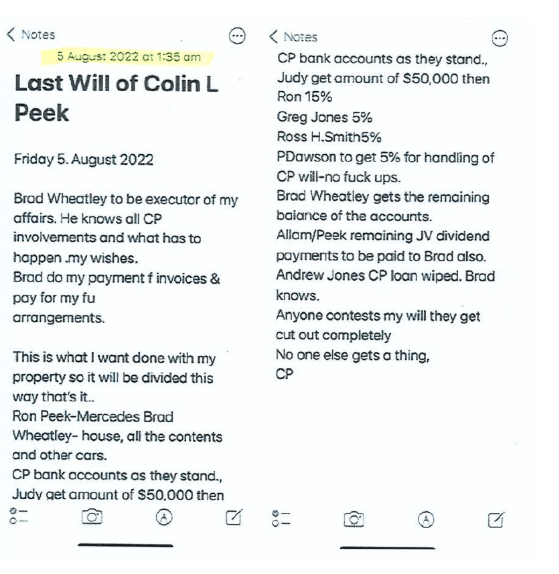The factual matrix involving Colin Peek is another of the ever-increasing number of cases concerning “informal wills”. That is, statements of testamentary intention that do not meet formal legal requirements to be a valid will, writes Matthew Burgess.

In this case (see Peek v Wheatley [2025] NSWSC 554), the deceased, left a digital note on his iPhone (titled “the last will of Colin L Peek”), setting out how his estate should be divided, which was created only days before his death (see the image below).

A friend and lawyer of Peek acted on behalf of the primary beneficiary under the iPhone note will. The primary beneficiary was another friend of the deceased (with the friend entitled to in excess of $10 million if the iPhone will was valid) – although the solicitor himself also stood to receive an entitlement (of in excess of $300,000) if the electronic note was held to be valid.
The family – who would inherit under the state-based intestacy regime if the iPhone note was held to be invalid – argued (successfully) that the note was simply a “working document” and never intended to amount to a final (informal) will.
In confirming that the deceased had not intended the document in the notes section of his iPhone to operate as his will, the court relevantly noted the following key points:
1. Lawyers need to be acutely aware of the risk posed to the administration of justice when they choose to act in proceedings and the lawyer also has a personal interest in the outcome of the case (see Barrak Corporation Pty Ltd v Kara Group of Companies Pty Ltd [2014] NSWCA 395).
2. Here, the relevant lawyer had a clear conflict between his personal interests and his overriding duty to the court and the administration of justice, as he:
(a) had a personal interest in the outcome of these proceedings as a beneficiary under the iPhone will;
(b) was a material witness in the proceedings; and
(c) was acting for a party in the proceedings.
3. While not passing comment on whether the lawyer had engaged in professional misconduct, the court specifically highlighted that the decision to discuss with another key witness how they would each testify in relation to certain evidence was improper and seriously undermined the probative value of the evidence of both of them, given the court could not be certain as to the extent to which their recollection of events was truly independent, or rather had been influenced by the version of the events given by the other (see Day v Perisher Blue Pty Ltd (2005) 62 NSWLR 731).
4. Arguably, the lawyer’s conduct was further called into question, given there was evidence of text messages and phone calls by the deceased to the lawyer shortly after the iPhone note was drafted, and the lawyer provided no evidence (despite requests in the hearing) as to the content of these communications – meaning, the court assumed the content to be unhelpful to supporting a conclusion that the note was intended to be a valid testamentary document.
5. That is, the failure by a party to call or give evidence that could cast light on a matter in dispute can be taken into account in determining whether that party has discharged its onus (see Jones v Dunkel [1959] HCA 8, Blatch v Archer (1774) 1 Cowp 63 and Australian Securities and Investments Commission v Rich [2009] NSWSC 1229);
6. The above factors, combined with the following points, meant the iPhone note was rejected by the court as an attempted will:
(a) text messages and emails were deleted from the iPhone by the friend and lawyer following the death of the deceased;
(b) the evidence about how the iPhone was managed after death left the court without confidence that the court had been provided all the relevant communications by the deceased, his friend and his lawyer regarding the purpose of the note; and
(c) the court had difficulty accepting the reliability of the evidence of the lawyer when he acted as a solicitor in the proceedings and prepared all the evidence for the friend, despite the conflict of interest and duty to the court.
7. Thus, the court held that the estate be administered in accordance with the intestacy regime – and the costs of the proceedings would be borne by the friend who claimed the iPhone note was intended to be a will.
Matthew Burgess is the director at View Legal.